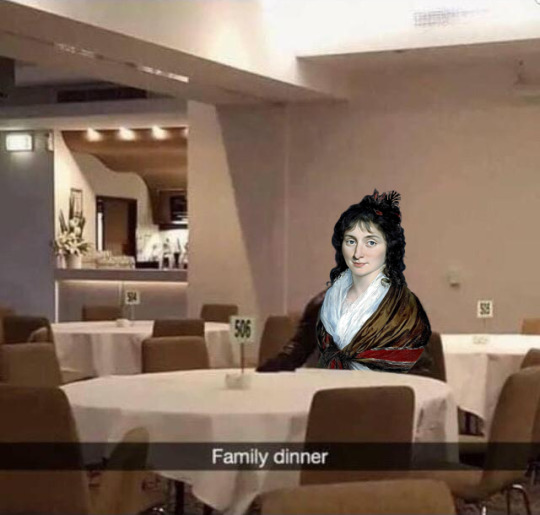monimarat
947 posts
Don't wanna be here? Send us removal request.
Note
Hello! I was wondering if you know anyone who's subscribed to the ARBR? If they were, were they French speaking? If one is keen on signing up for the ARBR membership and speak no lick of French is it worth it? I am aware that your money goes a long way for helping them preserve what little we have of Robespierre, especially for someone controversial, but is it weird to want to have the access to the perks they give their members but in English? I'm assuming there are members from the other parts of globe as well so yeah.
Hi! Sorry it took such a very long time to reply. I haven’t been on this tumblr much in a while and I’m not sure you’ll still see this. I myself am not a member of L’ARBR, but I did ask a couple of people who are and all of their content is indeed in French, so you would still need to translate any material they send out. As you say though, even just supporting them financially is meaningful, so I think it’s worth it for that. And my experience interacting with L’ARBR and the Saint-Just and Camille Desmoulins Associations is that they are very welcoming and happy to have more people engaged with and supportive of their work.
I did become a member of the Camille Desmoulins Association after visiting Guise. They send me all documents in French and we correspond mostly in English. It’s important to me personally to support local organizations, and in the case of the Desmoulins Association there has been an ongoing effort to provide a better space for the Desmoulins museum there that I would like to support.
So, in short, I think it’s very worthwhile!
Bonus tiny Robespierre in Guise:

27 notes
·
View notes
Note
if citizen robespierre is present please bid him inform his younger brother that bonbon is much adored by the citizens of paris.
This was a lovely message to see, especially after the veritable torrent of postings regarding a non-existent 'hit list'. I will pass your regards onto him when he comes back from his dinner with that young Corsican officer. -Citizen Robespierre
37 notes
·
View notes
Text
I knew Madame Duplessis until her death in 1835. This woman, one of the most distinguished of her time for her mind, her education, her character and her beauty, raised her grandson Horace with extreme care. Horace adored his father, whose writings he constantly reread. He had such a cult for his memory that he challenged to a duel all those he heard slandering this great citizen. He thus had several affairs in which he always killed or injured his adversary. He sought solitude and rarely left his grandmother and his aunt, Lucile's sister. Horace was constantly in mourning of his father and mother, and had resolved to keep it that way for all his life. In 1814, this worthy son of Camille Desmoulins was so ashamed and saddened by the return of the Bourbons that he went into exile. He died in America of an epidemic in 1817. [sic]
Histoire de la Révolution française (1850) by Nicolas Villiaumé, volume 4, page 76-77.
OK, that image I had of Horace Desmoulins as just adorable kiddo #1 took a sudden turn…
54 notes
·
View notes
Text
I knew Madame Duplessis until her death in 1835. This woman, one of the most distinguished of her time for her mind, her education, her character and her beauty, raised her grandson Horace with extreme care. Horace adored his father, whose writings he constantly reread. He had such a cult for his memory that he challenged to a duel all those he heard slandering this great citizen. He thus had several affairs in which he always killed or injured his adversary. He sought solitude and rarely left his grandmother and his aunt, Lucile's sister. Horace was constantly in mourning of his father and mother, and had resolved to keep it that way for all his life. In 1814, this worthy son of Camille Desmoulins was so ashamed and saddened by the return of the Bourbons that he went into exile. He died in America of an epidemic in 1817. [sic]
Histoire de la Révolution française (1850) by Nicolas Villiaumé, volume 4, page 76-77.
OK, that image I had of Horace Desmoulins as just adorable kiddo #1 took a sudden turn…
#this sounds embellished but I like the drama so I’ll take it#also I’m always so intrigued by what Horace’s life was like#I don’t think there are letters from or about him as an adult?#I wonder if Annette kept any and what happened to them#if they were with her other papers
54 notes
·
View notes
Text
Marat et Le Junius Français
I know it's been a while since I've done a post like this one, but that doesn't mean I've lost interest in writing about little-known anecdotes and adventures of Marat! One of them is the brief and chaotic existence of Le Junius Français, one of Marat's lesser-known newspapers, which he created and published during the month of June 1790.
The probable reason why hardly anyone knows that Junius Français existed (the only Marat historian I've ever seen mention it was Olivier Coquard in his Jean-Paul Marat, une lumière en Révolution : biographie d'un homme des Lumières devenu l'Ami du peuple) is that it only had 13 issues in total. Its publication was somewhat turbulent, lasting only three weeks, for obvious reasons. But it is still, in all its context, a very interesting and surprising periodical.
The creation of the short-lived newspaper comes at a complicated and somewhat hectic time for Marat, who had just returned from London in May and was keen to resume publication of L'Ami du Peuple and join the patriotic press. As usual, Marat had to remain underground, as he continued to be the target of legal proceedings and arrest warrants and the publication of L'Ami du Peuple was, unsurprisingly, banned by the authorities. In addition, there was also a constant fight against forgers - the fake Marat, plagiarists who published newspapers and pamphlets under his name, which may also confirm the influence and popularity he had gained at the time. These forgeries of L'Ami du Peuple began to appear in large numbers from 1790 onwards, and Marat made an effort to defend himself against them as soon as he returned to Paris. Not only him, but the Revolution in general was going through a turbulent situation. There had been conflicts involving bakers and grain, the question of war and federations, as well as other external crises that concerned France.
It was against this backdrop of accusations against conspirators, clandestinity and arrest warrants that Marat created Le Junius Français, a second newspaper, which was published for the first time on June 2, 1790. During its publication, Le Junius Français coexisted with L'Ami du Peuple, and both periodicals were published (almost) every day until the end of the first, in its 13th issue, on June 24.
On the structural aspects of the newspaper, Professor Coquard, already cited above as the main basis of this post, comments in Marat, L'Ami du Peuple [p.243]:
This second newspaper presents itself exactly like L'Ami du Peuple: an eight-page in-oitavo printed on poor quality paper that comes out of the workshops of "Guilhemat et Arnulphe, printers of Liberty, at 23 rue Serpent" and is distributed - door to door only - "every morning at number three rue Contrescarpe-Dauphine". Junius seems to focus more specifically on articles of denunciation, while L'Ami du Peuple is probably looking for more general political analysis. However, the two sheets are quite similar.
The name chosen by Marat for the newspaper, "Le Junius Français", also intrigued me. I found in this note apparently (?) written by G. Eljorf through Le gazetier révolutionnaire, a catalog of periodicals of the time, an explanation that seemed to me quite plausible and accurate about the title:
Lucius Junius Brutus and Marcus Junius Brutus are two figures from Roman history engaged in the struggle against tyranny, that of Tarquin and that of Caesar respectively. The pseudonym Junius had been used by an anonymous English pamphleteer around 1770 in a series of letters critical of the government of George III (Junius Letters).
We can speculate on various reasons why Marat might have created the newspaper in such a complex period. Perhaps it was one of his skillful political strategies to amplify his attacks on his enemies at a time of difficulty, but it could also have been the start of a newspaper that Marat actually planned to maintain, so that he could give L'Ami du Peuple another direction. The intentions and objectives of Junius Français, at least, are clearly explained on page 8 of the first issue:
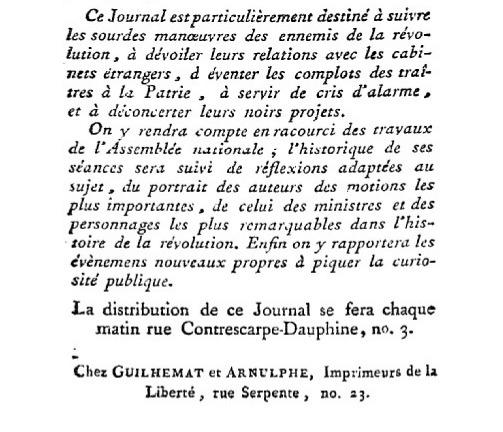
This journal is particularly intended to follow the deaf maneuvers of the revolution's enemies, to reveal their relations with foreign cabinets, to vent the plots of traitors to the Fatherland, to serve as a cry of alarm, to disconcert their dark schemes.
The history of its sessions will be followed by reflections adapted to the subject, portraits of the authors of the most important motions, of the ministers and of the most remarkable figures in the history of the revolution. Finally, it will report on new events likely to pique public curiosity.
In fact, at least in the first issue - which I analyzed more meticulously than the others - he does what he says. He first scolds the Parisians, in the same fraternal and unmistakable style as L'Ami du Peuple, and then recounts the May 31 session of the National Assembly, where a case of conflict between the grenadiers of the Royal Navy regiment was discussed in which a group of patriots had been brutally mistreated. He speaks briefly about the decisions concerning the civil organization of the clergy and denounces the Dutch. He constantly maintains the spirit of denunciation, calling on the people to take revenge. Although his name only appears in 4th issue, it's not hard to spot Marat's pen in every word.
Marat unfortunately didn't manage to keep publishing Junius Français for long. Certainly, the newspaper ceased publication at the end of June for a number of reasons, and among them there is no doubt that Marat must have been overwhelmed with writing and managing the printing and correspondence for two revolutionary periodicals at once. Expenses, lack of time and problems involving the printers of both Junius and L'Ami du Peuple must have contributed to the sudden demise of this newspaper.
I found it interesting to bring up Junius Français because, as well as being one of Marat's most unknown and neglected works, it is also one of his writings that impresses me the most, since he managed to keep both newspapers going at the same time in a chaotic context in which he had to hide from the police, manage the publication of other of his works, solve plagiarism problems and at the same time pay attention to the political situation in France, which was becoming increasingly tense. His commitment, his incessant dedication to producing even in the most difficult and theoretically impossible times is always fascinating, to say the least, and Junius Français is an example of how Marat's revolutionary activity was frenetic and tireless even underground and under threat from the government. His attempt to maintain the two newspapers, despite failing, went beyond Marat's own limits and was, in a way, a good propaganda tool against his political enemies.
34 notes
·
View notes
Text
went to Vizille with @tierseta and it was raining with an icy wind we were so cold
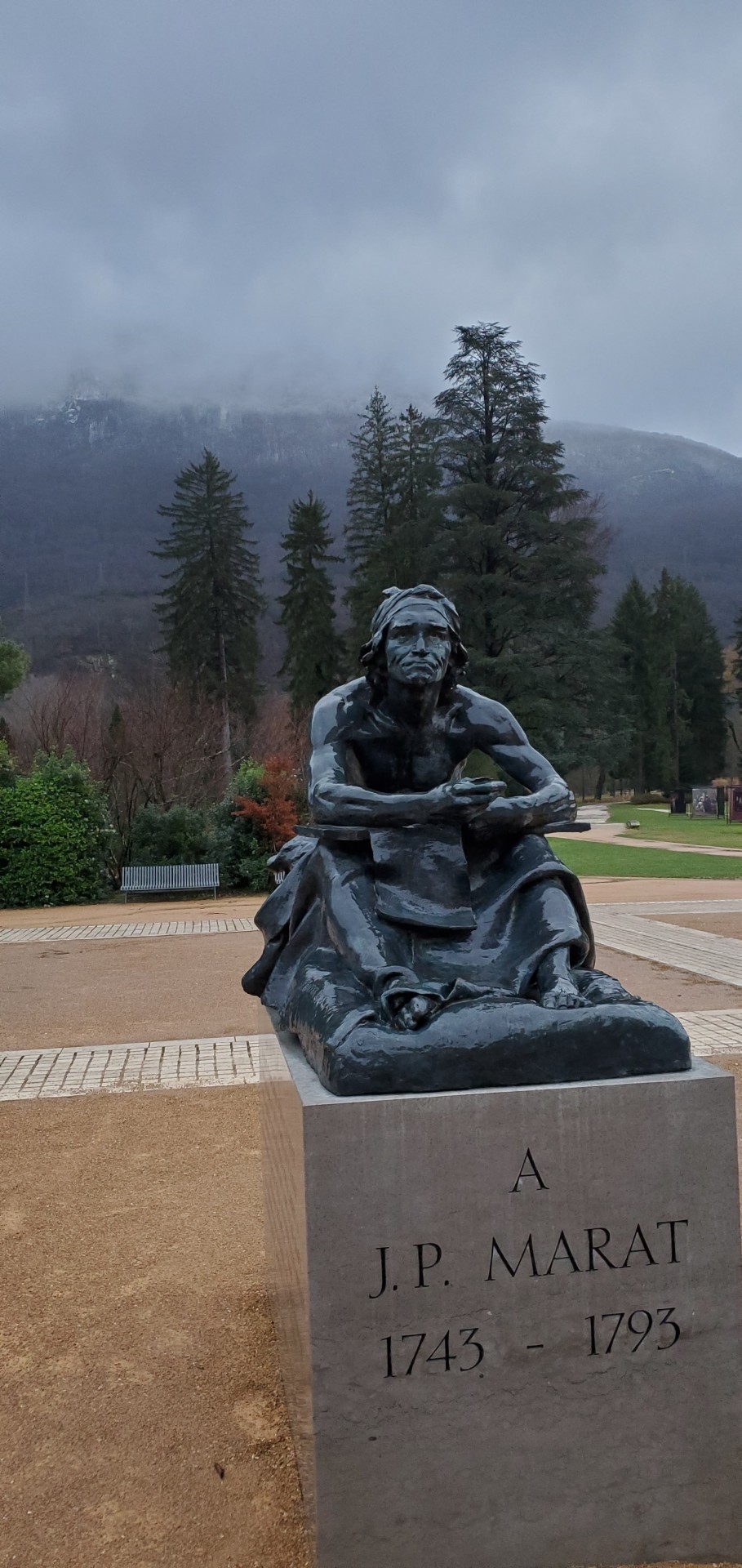
EVEN MARAT LOOKED COLD ❄️🥶❄️
119 notes
·
View notes
Text
Frev sketch dump + napoléon (1927) stuff (still haven't actually finished it)


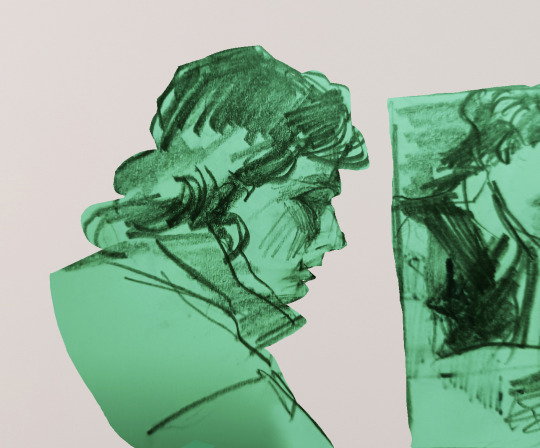
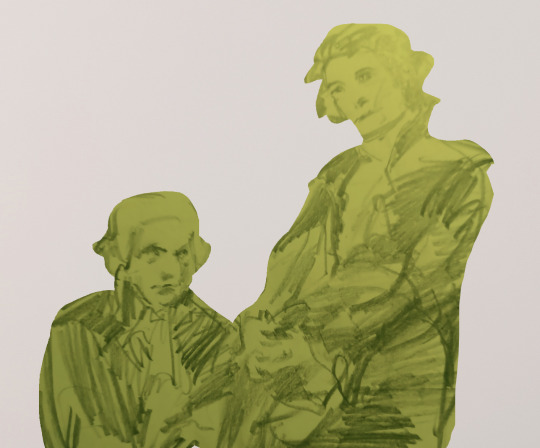
257 notes
·
View notes
Text
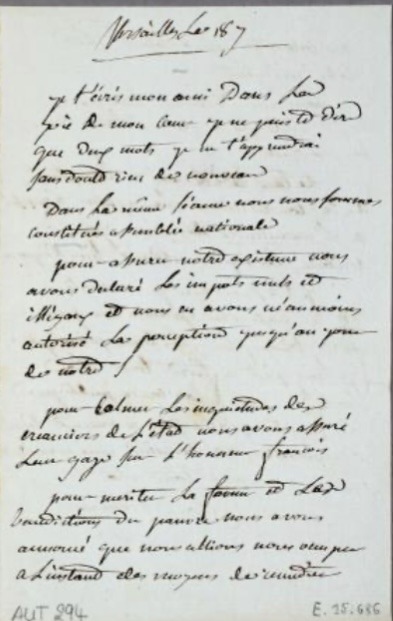

Letter from Pétion to Brissot dated June 18 1789, announcing that the Third Estate has declared itself the National Assembly
Anyone who sees/can transcribe what is says on these? Thought it would be interesting to know…
29 notes
·
View notes
Text
Last Saturday, madame Robert, wife of a man of letters and known patriot, and she herself the author of several works, passing through Quai Théatins, was accosted by three very elegant little men that told her to put down the three color cockade that this lady had tied to her hat. She refuses. These men follow her, repeating their insolent demands. You can take my life, but you cannot force me to put away my cockade, Madame Robert responded. Still followed and insulted, she took out a small knife and threatened her agressors. One of them points a dagger against her breast, she wards off the blow with a gravure roll (rouleau de gravures) that she held in her hand. Another assassin snatches her hat from her. A fourth arrives, and, taking the braves by the arm, tells them: Scatterbrains, don't go and act like Lambesc; you know that’s not for today. And these cutters, worthy game of the lower court of the Tuileries, fled when they saw some people approaching who were going to avenge their outrages. Thermomètre du Jour, number 222, August 9 1792
In vain did madame Robert ask for news of her husband, no one gave her any. She thought he was marching with the faubourg. “Yes,” she said to me, “if he perishes I will not survive him! But this Danton who remains in his bed, he, the rallying point, if my husband perishes I will be the woman to stab him!” Her eyes were rolling. From that moment on I never left her side. What did I know what could happen? To know what she was capable of… Lucile Desmoulins describing her activities during the night of the Insurrection of August 10 (1792)
OK, now I have a much better appreciation for why Lucile took that threat so seriously…
26 notes
·
View notes
Note
hi there!! i was wondering you knew anything about the relationship between robespierre and marat? ive been seeing some information that robespierre wasnt fond (or at least less fond??) of marat than marat was of robespierre, but havent found any other information about it unfortunately. thanks :)!
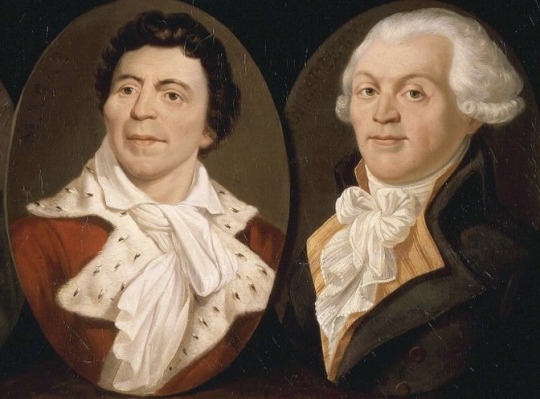
In total, Marat mentions Robespierre around 90 times in his journals from his debut in September 1789 up until his death in July four years later. The first time he does so (which also happens to be the first connection I’ve been able to find between the two) is already in the second number of l’Ami du Peuple(released September 13 1789) where he writes about a certain ”Robertpierre.” Then one day later, in number 4, he instead mentions a ”Robers-Pierre.” In both these instances, Marat does however appear to just give the exact same summary as three other journals, and there’s value put into it whatsoever.
It would appear Marat never got a hold on how to spell Robespierre’s name properly, as he throughout the rest of his career as a journalist inconsistently shifts between calling him ”Robespierre,” ”Roberspierre” and, in some rare instances, ”Robertspierre.” The next time he mentions him is in number 81 (December 29 1789). The following three times Robespierre is brought up in l’Ami du Peuple are the very first instances of Marat showing his own thoughts on him instead of just giving a neutral summary of things he’s said at the National Assembly:
M. de Robespierre and especially Mr. Charles de Lameth energetically fought against the inconsiderate proposal to give praise to officers, whose conduct has harmed the liberty and security of citizens. l’Ami du Peuple, number 101 (January 18 1790)
M. de Robespierre supports the motion of Mr. de la Salcette, with more or less solid arguments. l’Ami du Peuple, number 104 (January 21 1790)
…to remove from the fatherland its most zealous defenders, [the Municipal Research Committee] pushed its audacity to the point of directing its pursuits against Barnavre, Péthion [sic] de Villeneuve, the Lameths, d'Aiguillon, Roberspierre [sic]..., cherished names of the free France, to which it had added those of La Fayette and Mirabeau. l’Ami du Peuple, number 108 (May 20 1790)
This praising of Robespierre is something Marat would consistently keep up throughout the rest of his journalistic career. Only throughout the rest of 1790, we find him calling him ”the wise Robespierre” (number 156 (July 7), ”the loyal Robespierre” (number 210 (September 3), an orator with ”great principles” and ”excellent views […] [that] we have no doubt he will develop in a way that will cause a sensation.” (number 265 (October 29) and ”[a man] who’s heart always appears to be animated with the purest of civism” (number 320 (December 24), listing him among deputies he considers ”patriotic” (number 156 (July 7), number 188 (August 11), number 210 (September 3), number 277 (November 11), number 288 (November 22), number 292 (November 28) and at one point even playing him on a higher level than so, calling him ”the only deputy who is educated in great principles, and perhaps the only true patriot who sits in the Assembly” (number 263, October 27).
February 2 1791 is the first instance where Robespierre in his turn is recorded to have mentioned Marat’s name. He does so defending the journalist at the Jacobins after an arrest warrant has been issued against him for an article recently published in his paper. Desmoulins’ Révolutions de France et de Brabant, the journal giving the most detailed description of the defence, summarizes it in the following way:
At the same session at the Jacobins, Robespierre, the only member of the National Assembly to whom the severe Marat would not have given the black ball, also took up his defense. He made us aware of the absurdity of the crime that the president of research attributed to the Friend of the People, of getting along with the English. Marat had never ceased to deplore the trade treaty of 1786 with the English, and to vociferate against Pitt, and against the intelligence of the cabinet of S. James, with the Austrian committee of the Tuileries. In favor of Marat was also this thing which militates so strongly for all patriotic writers: if the Friend of the People is extreme and angry, at least it is in the direction of the revolution. On what front did the research committee sign this order against him, under the ridiculous pretext of intelligence with the English, while it at the same time leaves Durosoi, as extreme, as bloodthirsty as Marat, in peace, and so many other friends of the king, the nobility and the clergy, who did not even hide their understanding with the Austrians, with all our enemies, and every day invite them with loud cries to come and slaughter the patriots. There is no reply to this reasoning; so Voidel, who saw his condemnation in everyone's eyes, recognized his sin, and promised to withdraw the order and remove the sentence.
In a speech regarding liberty on the press held on May 11 1791, Robespierre also says that ”if it is true that the courage of writers devoted to the cause of justice and humanity is the terror of the intrigue and ambition of men in authority; the laws against the press must become in the hands of the latter a terrible weapon against liberty,” which according to the by publisher inserted footnote is an allusion to the situation of the journalists Desmoulins and, especially, Marat.
Marat in his turn continued his praising of Robespierre throughout the same year. Besides grouping him together with other men considered patriotic (number 342 (January 16), number 371 (February 14), number 382 (February 25), number 392 (March 7), number 455 (May 11), number 519 (July 15), number 526 (August 1), number 562 (September 30) and calling him things such as ”the loyal Robespierre ”(number 367 (February 8), number 478, number 443 (April 29), number 458 (May 14), (June 3), number 488 (June 13), number 520 (July 16), number 521 (July 17) ”the just Robespierre” (number 409 (March 24) and ”the virtuous Robespierre” number 438 (April 21) he also goes further in placing Robespierre on a higher level than his fellow representatives, frequently going so far as to call him ”the only pure member of the Assembly” (number 414 (March 29), number 462 (May 18), number 472 (28 maj), number 475, May 31, number 504 (June 28), number 510 (July 4), number 511 (July 5). He also starts to frequently refer to Robespierre as ”the Incorruptible”number 458 (May 14), (number 462 (May 18), number 504 (June 28), number 514 (July 8), number 513 (July 13), number 545(September 4), number 551 (September 10) In his Robespierre biography (2014), Hervé Leuwers writesthat, if it was Fréron who coined the nickname, Marat nevertheless did a lot to popularize it. Finally, his number 515 (July 9) Marat dedicates entirely to the ”superb speech” held by Robespierre regarding the flight to Varennes two weeks earlier. His admiration did not go unnoticed by other journalists besides Desmoulins, such as those behind Les Sabbats jacobites, who on April 10 1791 called Robespierre ”the hero of Marat” and those behind Journal générale de France who called him ”the god of Marat, Garat, Carra, Corsas and Marte” on June 13 the same year.
Once Robespierre on September 30 ceases to be a member of the National Assembly, the apperences of his name in l’Ami du peuple do however rapidly decrease, only appearing two more times (number 603 (November 19), number 618, December 6) until Marat temporarily puts it down on December 15.
The first actual meeting between Marat and Robespierre didn’t take place until January 1792, as revealed by the latter ten months later. By then, the two almost lived neighbors since about a month back, Marat having gone to live with the Evrard sisters on 243 rue Saint-Honoré in Decenber, not far from the Duplay house on number 366 on the same street.
One of the most terrible reproaches that people have aimed against me, I do not hide it, is the name of Marat. I will therefore begin by telling you frankly what my contacts with him have looked like. I could even make my profession of faith on his behalf, but without saying more good or more bad than I think, because I do not know how to translate my thoughts to appeal to general opinion. In January 1792, Marat came to see me. Until then, I had not had any kind of either direct or indirect relationship with him. The conversation turned to public affairs, about which he spoke to me with despair. I told him everything that the patriots, even the most ardent ones, thought of him; namely that he himself had put up an obstacle to the good that could be produced by the useful truths developed in his writings, by persisting in eternally returning to extraordinary and violent proposals (such as that of making five to six hundred guilty heads fall), which revolted the friends of liberty as much as the supporters of the aristocracy. He defended his opinion; I persisted in mine, and I must admit that he found my political views so narrow that some time later, when he had resumed his journal, which had been abandoned by him for some time, reporting on the conversation of which I have just described speaking, he wrote in full that he had left me, perfectly convinced that I had neither the views nor the audacity of a statesman; and if Marat's criticisms could be titles of favor, I could still place before your eyes some of his sheets, published six weeks before the last revolution, in which he accused me of feuillantism, because I, in a periodical work, did not say out loud that the constitution had to be overthrown. After this first and only visit from Marat, I found him again at the National Assembly.
In number 648 (May 18) of l’Ami du Peuple, Marat gives his own version of this meeting:
I therefore declare that not only does Roberspierre [sic] not have my pen at his disposal, although it has often served to do him justice; but I protest that I have never had any note from him, that I have never had any direct or indirect relationship with him, that I have never even met him but once; also in this instance, our interview served to give rise to ideas and to manifest feelings diametrically opposed to those that Guadet and his clique attribute to me. The first word that Robespierre addressed to me was the reproach of having myself partly destroyed the prodigious influence that my paper had on the revolution by dipping my pen in the blood of the enemies of liberty, by speaking of rope, of daggers, no doubt against my heart, because he liked to convince himself that these were just empty words dictated by circumstances. Learn, I replied to him immediately, that the influence that my paper had on the revolution was not due, as you believe, to these close discussions in which the vices of the fatal decrees prepared by the Constituent Assembly are methodically developed, but to the terrible scandal that it spread among the public, when I unceremoniously tore the veil which covered the eternal plots hatched against public liberty by the enemies of the fatherland, people conspiring with the monarch, the legislators and the main custodians of authority; but to the audacity with which I trampled underfoot every detracting prejudice; but to the outpouring of my soul, to the impulses of my heart; to my violent protests against oppression, to my impetuous outings against the oppressors; to my painful accents; to my cries of indignation, fury and despair against the scoundrels who abused the trust and power of the people to deceive them, rob them, load them with chains and precipitate them into the abyss. Learn that there has never been a decree attacking liberty and that never an official has allowed himself an attack against the weak and the oppressed, without me having hastened to raise the people against these unworthy prevaricators. The cries of alarm and fury that you take for empty words were the naive expression with which my heart was agitated; learn that if I had been able to count on the people of the capital after the horrible decree against the garrison of Nancy, I would have decimated the barbaric deputies who had issued it. Learn that after the investigation of the Châtelet on the events of October 5 and 6, I would have had the unfair judges of this infamous tribunal perished at the stake. Learn that after the massacre on the Champ-de-Mars, had I found two thousand men animated by the feelings which tore me apart, I would have gone at their head to stab the general in the middle of his battalions of brigands, to burn the despot in his palace and impale our atrocious representatives on their seats as I declared to them at the time. Robespierre listened to me with fear, he turned pale, and remained silent for some time. This interview confirmed for me the opinion that I had always had [sic] of him: that he combined with the knowledge of a wise senator the integrity of a truly good man and the zeal of a true patriot, but that he also lacked the views and audacity of a true statesman.
In 1793, Jacques Roux also claimed to have gone home to Marat the year before and there have received ”a letter for Robespierre and for Chabot, the goal of which was to interest the Jacobin club to propagate an edition of your works.” I can however find no letter from Marat to Robespierre in the latter’s correspondence, nor even a letter to or from Robespierre that so much as mentions Marat (and the same thing goes for Marat’s correspondence). So did Robespierre actually receive this letter, we might assume he didn’t think all that much about it.
Despite Robespierre’s frosty attitude, Marat continued to hold admiration for him when he started up his journal again on April 12 1792, dedicating almost all of number 648 (May 3) and number 660 (May 29) with defending him against girondin attacks, a struggle which he describes as existing ”between the traitor Brissot and the Incorruptible Robespierre” (number 643 April 28 1792).
On September 9, Robespierre held a speech which he ended by recommending voting for Marat and Legendre for the National Convention (he did however deny that be had singled out Marat ”any more particularly than the courageous writers who had fought or suffered for the cause of the revolution” two months later). On September 21 1792, the day after the opening of said Convention, the last number of l’Ami du peuple appears, and a few days later Marat starts a new journal — Journal de la République française (it changed name to Le Publiciste de la République française in March 1793) that would run up until his death in July the following year. In total, Robespierre’s name gets mentioned around 35 times in this journal. As far as I can see, Marat does however appear to have cooled down a bit with his praising, mostly mentioning Robespierre in the context of reciting something he’s said or at tops mentioning him alongside other ”patriotic” deputies. In number 239, released the day before his death, Marat inserts a letter to Robespierre from a certain Labenette, ”orator of the people.”
The fact that Robespierre and Marat didn’t have any contacts with one another was not something that was believed by all contemporaries. Already in 1791, the journal Le Défenseur du Peuple had describedthe former as ”the friend of Marat, who he pretends to doesn’t know.” These allegations got a lot more serious in the fall of 1792, with the two plus Danton being accused of wanting to form a triumvirate, or having arranged the September Massacres together. On September 25 Marat openly denied that any of these allegations aligned with reality, that he had discussed the idea if a dictatorship or triumvirate with Danton and Robespierre, but that both had rejected it:
Certain members of the Paris deputation are accused of aspiring to dictatorship, to triumvirate, to tribunate; This absurd indictment can only find supporters because I am part of this deputation: well! monsieurs, I owe it to justice to declare that my colleagues, notably Danton and Robespierre, constantly rejected any idea of dictatorship, triumvirate and tribunate, when I put it forward; I even had to break several lances with them on this subject.
The very same day, Robespierre made allusions to Marat when regretfully declaring ”it was then that the thoughtless phrases of an exaggerated patriot or the signs of confidence he gave to men whose incorruptibility he had experienced for three years were attributed to us as crimes.”
On October 19 appeared the first number of Lettres de Maximilien Robespierre, membre de la Convention nationale de France, à ses commettants. In number 6, when discussing Marat getting interupted when laying out some own theories on the battalions of Mauconseil to the point that the Jacobins have to move with the agenda due to the tumult, Robespierre writes: ”Whatever the deviations of Marat's imagination, good citizens nonetheless groaned to see personal sentiments make the interests of immocence and oppressed patriotism forgotten, and hateful passions banished from the sanctuary of the laws. dignity, calm and love of humanity.” In number 9 he also writes that ”in his wanderings, Marat often encountered the truth.”
Robespierre also mentioned Marat when the Lettres in January 1793 got renewed for a second edition, starting already in number 1, where he for long defended himself against the girondin Gensonné linking him and Marat together:
What obstinacy to want me to be someone other than myself? It doesn't even matter to you that everyone believes that I named Marat: having been unable to succeed, you have decided to repeat my name so often with his, that I was at least taken for an accessory of this great character, so celebrated in your pages; as if I had not had an existence of my own, several years before you had decided to strip me of it; as if my constituents and my fellow citizens had not been able to judge me by my own actions; while Marat wrote underground, and Brissot still obscurely intrigued, with the henchmen of the old police, his colleagues, and crawled in the antechambers of the men in power. In the past, I still remember, Brissot and a few others had entered into I don't know what conspiracy to make my name almost synonymous with that of Jérôme Pétion; they took so much trouble to put them together. I don't know if it was for love of me or of Pétion: but they seemed to have plotted to send me to immortality, in company with the great Jérôme. I have been ungrateful; and, to punish me, they said: since you don't want to be Pétion, you will be Marat. Well, I declare to you, monsieurs, that I want to be neither. I have the right, I think, to be consulted on this, and you will perhaps not dispose of my being in spite of myself.
It's not that I want to deny Marat the justice that is due to him. In his papers, which are not always models of style or wisdom, he nevertheless stated useful truths, and waged open war against all powerful conspirators, although he may have been wrong about a few individuals. I know that he did not spare you yourselves: but this merit has not erased in my eyes, these extravagant sentences which he sometimes mixed with the healthiest ideas, as if to give to you and to your likes, the pretext of slandering liberty. It was said a long time ago that, in this respect, Marat was the father of the moderates and the feuillans; we could say for the same reason that he is also your boss; and we would be tempted to believe that he only punishes you because he loves you. I bet you love him too, although you pretend to shout very loudly at the slightest correction he gives you. Indeed, what would you be without him? What would become of all your newspapers and all your harangues if he had not written these two or three absurd and bloodthirsty sentences, which you constantly strive to repeat and comment on? You would have perhaps been reduced to becoming patriots, if he had not provided you with the pretext of disguising patriotism as maratism, in order to give to incivism, feuillantism, royalism and rascality, I don't know what air of wisdom and moderation.
It is so convenient for the enemies of liberty to simply appear to be the adversaries of Marat, and to confuse the cause of liberty with the person of an individual, in order to be excused from respecting it. Such was the policy of the first aristocrats, and of the heroes of the intrigue, whose disgraces you will share, after having imitated their exploits. Like them, you want to persuade all of Europe that the Republicans of France, that the partisans of the principles of equality, are only one faction, and that this faction is Marat himself. Thus, thanks to the gift of metamorphoses with which you are eminently endowed, Paris, the Jacobins, the members of the Convention, who do not bend to the views of the intriguers, and Marat are precisely the same thing. All the energetic friends of liberty are, at most, only satellites drawn into the whirlwind of this new star. With this magical name, you claim to overthrow the entire work of our revolution. It is to carry out this great work that you write, that you print, that you speak, that you plot tirelessly: but the revolution will triumph over the name of Marat, as well as over your intrigues; we will do justice to you and to him, by disproving his deviations and by disconcerting your plots. A journalist's sentences have never made a guilty head roll; but the plots of ambition that you seem to forget have caused torrents of human blood to flow. The crimes of tyranny cost humanity more disasters than the most heroic periods of the most atrocious writer. Only you, gentlemen, can give importance to an exaggerated man, much less through your declamations than through your conduct. It would not even be noticed under a wise government. It is only oppression that forces the people to pay less attention to faults that they themselves do not believe, than to the courage of those who unmask their enemies.
He defends himself against the charge of him and Marat being the leaders of a coalition, ”when these deputies, too independent to form a coalition, even with a view to the public good, see every day the coalition of factions.” again in number 3. In number 9, the second to last number, he rhetorically asks whether ”giving ridiculous importance to some inconsistent and bizarre journalist, to charge him with all the iniquities of Israel, and to identify with him all the defenders of freedom?” really is such a good way to ensure tranquility.
Between December 1792 up until the death of Marat, we find him and Robespierre taking part in the same debates at both the Convention and the Jacobin club, sometimes agreeing (December 26, February 21) and sometimes disagreeing (December 16, March 3, June 18) with each another.
On January 4 Robespierre complains that a speech made by Barère regarding the fate of Louis XVI ”contains the most violent diatribes against the patriots” for having stated ”If anything could have made me change my mind [on an appeal to the people], it would be to see the same opinion shared by a man whom I cannot bring myself to name (Marat), but who is known for his bloodthirsty opinions...” A month later, February 11, Marat and Robespierre together calmed down a group of petitioners, disgruntled over not having received a hearing at the Convention. When a representative on February 26 asked ”that Marat be temporarily expelled from the Assembly and be locked up so that it could be examined whether he was crazy” and another one ordered the referral of the denunciation to the ordinary courts, ”Robespierre approaches the president, and there he announces that if the decree passes, Paris will be burning today.”
On 12 April Robespierre spoke against the arrest order issued against Marat the very same day — ”One has requested a decree of accusation be drawn up against the warmest patriots […] Marat spoke with force, precision, and at the same time with moderation. He painted the crimes of our enemies with colors capable of making any man who has any sense of modesty blush.…”
When the indictment against Marat was presented on April 13, Robespierre took to the floor a total of three times to speak against it:
To the question that agitates us, we will not disagree that the man in question excites very strong passions; you are asked if you will decree a representative of the people immediately, or if you will postpone until Wednesday; there is no respect there for the principles, and for what we owe to the character of representative of the people: what, you would send a slanderous report, when nothing is proven, and is it not barbaric to put a representative under accusation without examination; this report is the fruit of passions and liberticidal conspiracies. […]
Yes, it will be proven that this man, whom I have always seen as patriotic, was only attacked to prove that all the Republicans in this Assembly are exaggerated and must suffer the same fate.
…As I see in this whole affair only the developed spirit of the Feuillants, the moderates and all the cowardly assassins of liberty, only a vile intrigue hatched to dishonor patriotism, the departments infested for a long time with the liberticidal writings of royalists, I reject with contempt the proposed decree of accusation.
Marat was acquitted on April 24, and four days later, a motion proposed by him with an amendment from Robespierre was passed at the Jacobin Club.
One day after the murder of Marat, July 14 1793, Robespierre spoke against the idea of granting him a state funeral, arguing that there were much more urgent things that needed to be taken care of before that could happen:
Robespierre: I have little to say to the Society. I would not even have asked to speak had the right to do so not somehow devolved to me at this moment; if I did not foresee that the honors of the dagger are also reserved for me, that priority has only been determined by chance, and that my fall is fast approaching. When a man, deeply sensitive and imbued with a love of the public good, sees his enemies raise their heads with impunity, and already share the spoils of the State, and his friends, on the contrary, frightened by oppression, flee a murderous soil and abandon it to fate, he becomes insensitive to everything, and no longer sees in the tomb anything other than a safe and precious asylum reserved by Providence for virtue. I believed that a session which followed the murder of one of the most zealous defenders of the fatherland, would be entirely occupied with the means of avenging him by serving said fatherland better than before. We haven't talked about it, and what are you occupying yourselves with in this precious time, for the use of which we are accountable? We are dealing with outrageous hyperboles, ridiculous and meaningless figures, which do not provide a remedy to the thing at hand and prevent it from being found. For example, you are seriously asked to discuss the fortune of Marat. Well! What does the fortune of one of its founders matter to the Republic? Is it a memoir that we are going to occupy ourselves with, when it is still a question of fighting for it? One is speaking of the honors of the Pantheon. And what are these honors? Who are those who lie there? With the exception of Le Peletier, I can’t see a single virtuous man there. Is it next to Mirabeau we will place Marat? Next to this intriguing man whose means were always criminal; this man who only earned his reputation through profound villainy? Here we have are the honors requested for the Friend of the People.
Bentabole: Yes, and he will obtain them in spite of those who are jealous of him.
Robespierre: Let us occupy ourselves with the measures which can still save our fatherland; let's make the effect of Pitt's guineas null. Let's bring the Cobourg and the Brunswick back to their territories. It is not today that we must show the people the spectacle of a funeral ceremony, but when finally victorious, the strengthened Republic will allow us to take care of its defenders; all of France will then ask for it and you will undoubtedly grant Marat the honors that his virtue deserves, that his memory demands. Do you know what impression the spectacle of funeral ceremonies attaches to the human heart! They make the people believe that the friends of liberty are thereby compensating themselves for the loss they have caused, and that from then on they are no longer required to avenge it; satisfied with having honored the virtuous man, this desire to avenge him dies in their hearts, and indifference succeeds enthusiasm and his memory runs the risk of oblivion. Let us not stop seeing what can still save us. The assassins of Marat and Peletier must come and atone on the Place de la Révolution for the atrocious crime of which they are guilty. It is necessary that the perpetrators of tyranny, the unfaithful representatives of the people, those who display the banner of revolt, who are convinced that they are sharpening the daggers on their heads every day, of having murdered the fatherland and a few of its members; it is necessary, I say, that the blood of these monsters responds to us and avenges us for that of our brothers which flowed for liberty, and which they shed with such barbarity. We must share the most painful burdens of the State; one must instruct all the people and gently lead them back to their duties; the other must render them exact justice: one must make food flow everywhere; the other deals exclusively with agriculture and the means of multiplying its relations; another must make wise laws; someone else must raise a revolutionary army, exercise and harden it, and know how to guide it in battle. Each of us must, forgetting ourselves at least for a while, embrace the Republic and devote ourselves unreservedly to its interests. The municipality must rule out, for the moment, a funeral celebration, which at first seemed dear to our hearts, but whose effects, as I have demonstrated, can become disastrous.
The following day, July 15, Robespierre asked that Marat’s printing presses be obtained by the Jacobins, a request a different member had already made the day before. A week later, July 22, the club tasked Robespierre, Desmoulins, Dufourny and Le Peletier’s brother with writing an adress to the French people about the murder. Said adress was printed and read aloud at the club four days later, obviously deploring of the event and praising Marat.
On August 5, Robespierre denounced Jacques Roux and Jean Théophile Victor Leclerc as ”two men paid by the enemies of the people, two men that Marat denounced [that] have succedeed, or think they have succeeded this patriot writer.” Three days later, August 8, Simonne Evrard, ”the widow Marat” presented herself before the Convention and held a long speech defending her dead fiancé’s memory, that in her view had gotten hijacked by ”scroundel writers” and in particular the two men already denounced by Robespierre. After her speech was finished, Robespierre again took to the floor to demand that the speech be printed and ”that the Committee of General Security be required to examine the conduct of the two mercenary writers denounced to it; the memory of Marat must be defended by the Convention and by all patriots.” Indeed, Roux and Leclerc would soon thereafter find themselves imprisoned, the former in September 1793, the latter in April 1794. How much of this was Robespierre being genueinly concerned for Marat’s memory and how much it was him using said memory to rid himself of a political rival I will leave unsaid…
On November 23, when Robespierre gives clarifications regarding the CPS changing the general in charge of the taking of Toulon, he says that it was on the recommendation of Marat that the new general had been promoted to rank of brigade leader. ”Marat could have been wrong, but his recommendation was a very favorable presumption in favor of an individual; he has always justified it since.” On 10 January 1794 he exclaims that ”my dictatorship is that of Le Peletier, of Marat. Or I don’t mean that, I don't want to say that I resemble them: I'm neither Marat nor Pelletier; I am not yet a martyr of the Revolution; I have the same dictatorship as them, that is to say the daggers of tyrants.” In an undelivered speech written shortly thereafter he again describes Marat and Le Pelerier as martyrs and Leclerc and Roux as”mercenary writers, daring to usurp the name of Marat, to desecrate it.”
Finally, on 9 thermidor, we find the following two claims made against Robespierre that involves Marat. (1, 2) I will leave them as they are as it’s very hard to know if they’re legit or not:
Dubois-Crancé: I must pay tribute to the sagacity of Marat: at the time of the judgment of the tyrant Capet, he said to me, speaking of Robespierre: ”You see that rascal? That man is more dangerous for liberty than all the allied despots.”
Collot d’Herbois: I am going to cite a fact which will prove that Robespierre, who for some time spoke only of Marat, always hated this constant friend of the people. At Marat's funeral, Robespierre spoke for a long time on the platform that had been set up in front of the Luxembourg, and the name of Marat did not come out of his mouth once; Can the people believe that a person loves Marat when he angrily declares that he doesn’t want to be assimilated to him? No, although these hypocrites talked incessantly about Marat and Challier, they loved neither of the two.
Alphonse Esquiros, who tracked down Marat’s younger sister Albertine for an interview in the 1830s or 1840s, reported that it was ”with bitterness” she spoke of Robespierre. ”There was nothing in common, she added, between him and Marat. Had my brother lived, the heads of Danton and Camille Desmoulins would not have fallen.”
Robespierre’s little sister Charlotte (who Albertine despised) did in her turn write the following regarding the relationship in her memoirs (1834). This anecdote is however suspeciously similar to the meeting Marat and Robespierre describe as having happened in January 1792, in which Charlotte impossibly could have taken part, still not having gone to Paris by then:
I have often heard my brother’s name attached to that of Marat, as if the way of thinking, the sympathies, the acts of those two men were the same, as if they had acted in concert. It is thus that the portraits and busts of Voltaire and Rousseau are placed side by side, as if those two great writers had been the best friends in the world when they were alive, while in truth they found each other insufferable. I do not claim to discount Marat’s merit, nor make an attempt on the purity of his devotion and of his intentions. Some have dared to say that he was in the pay of foreigners; but have they not said that of my brother? The field of the absurd is immense and limitless. Have they not said of Maximilien Robespierre that he had asked the young daughter of Louis XVI in marriage? After such an accusation nothing should be surprising anymore; more burlesque and impossible assertions must be expected; it is the nec plus ultra of inanity. To return to Marat, I will dare to affirm that he was not an agent of foreigners, as it has pleased some to say; Marat had felt the infamies of the Ancien Régime and the poverty of the people strongly; his fiery imagination and his irascible temperament had made him an ardent, and too often even imprudent, revolutionary; but his intentions, I repeat, were good. My brother disapproved of his exaggerations and his rages, and believed, as he said many times to me, that the course adopted by Marat was more detrimental than useful to the revolution. One day Marat came to see my brother. This visit surprised us, for, usually, Marat and Robespierre had no rapport. They spoke first of affairs in general, then of the turn the revolution was taking; finally, Marat opened the chapter on revolutionary rigors, and complained of the mildness and the excessive indulgence of the government. “You are the man whom I esteem perhaps the most in the world,” Marat said to my brother, “but I would esteem you more if you were less moderate in regard to the aristocrats.” “I will reproach you with the contrary,” my brother replied; “you are compromising the revolution, you make it hated in ceaselessly calling for heads. The scaffold is a terrible means, and always a grievous one; it must be used soberly and only in the grave cases where the fatherland is leaning toward its ruin.” “I pity you,” said Marat then, “you are not at my level.” “I would be quite grieved to be at your level,” replied Robespierre. “You misunderstand me,” returned Marat, “we will never be able to work together.” “That’s possible,” said Robespierre, “and things will only go the better for it.” ”I regret that we could not come to an understanding,” added Marat, “for you are the purest man in the Convention.”
129 notes
·
View notes
Note



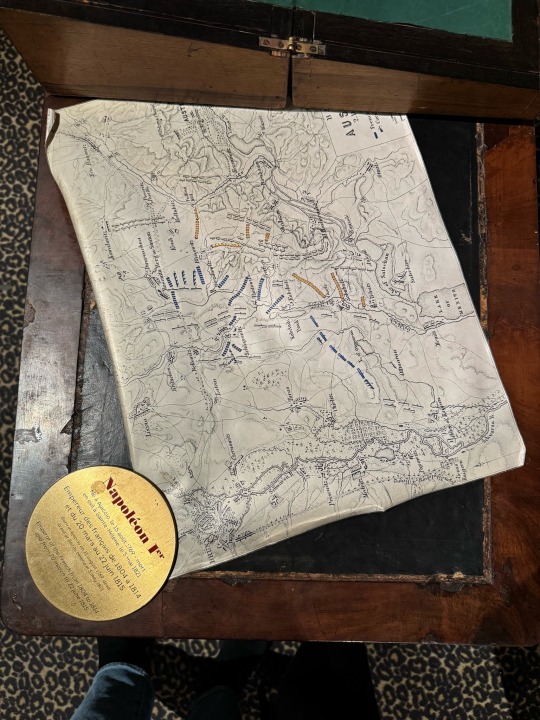
Ran into a couple of young Napoleons at the Musée Grévin while looking for a missing bathtub
Rating: Cute!
It’s not uncommon to keep more than one Napoleon in the same enclosure. Napoleons are social animals and enjoy the company.
These Napoleons look like they have a lot of enrichment: there’s camels, which, while Napoleons always look uncomfortable on they really like being tall; maps too, and Napoleons love playing with maps!
This zoo is really keeping its Napoleons enriched. I hope it lets them go to war sometimes. I also hope there is that missing bathtub in there somewhere: Napoleons are cleanly and they love bathing!
51 notes
·
View notes
Text
Here are a few more photos from @burritofriedrich ‘s and my visit to Saint-Just’s house in Blérancourt!
There are five ground floor rooms that make up the museum, with reproductions of many portraits, documents and other objects. The first room is now a library and playroom for the local school:

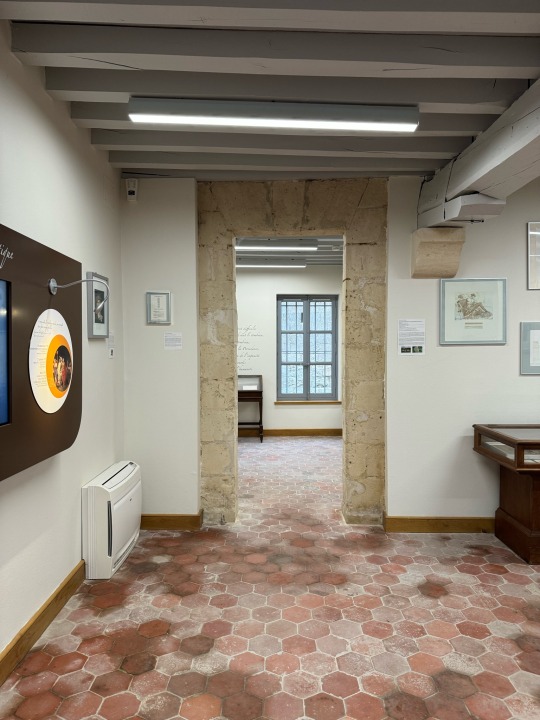
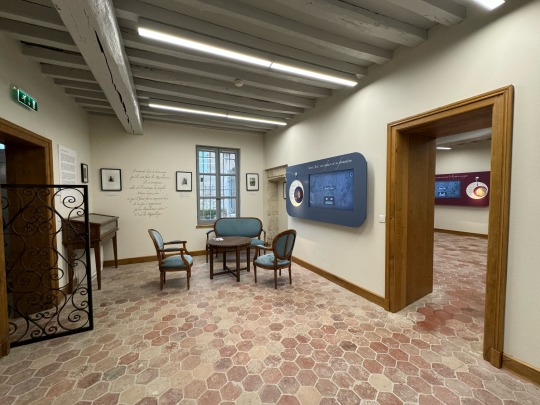

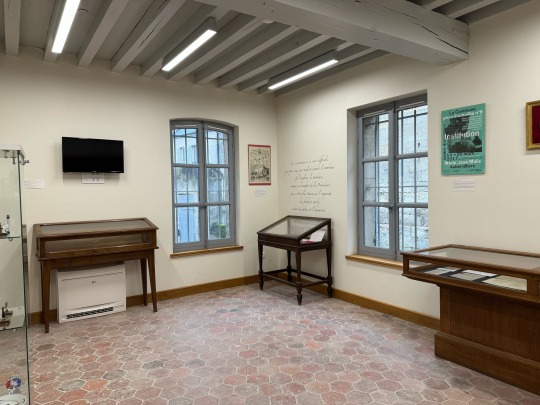
The reproductions include a letter to Desmoulins, his baptismal record, and his sketch of the head of Antinous



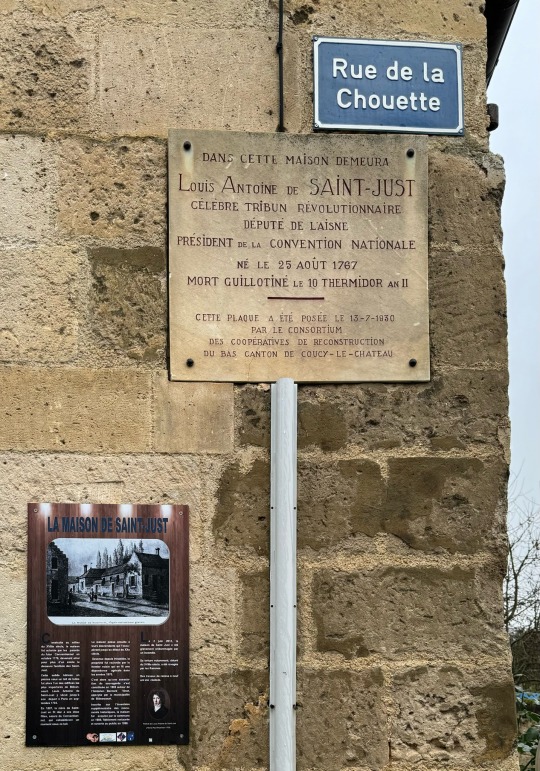

@robespapier
107 notes
·
View notes
Note
What did Marat think of the CPS members?
Hi, anon! 👋
First of all, I'd like to apologize for taking so long to answer your question. I was very busy with various things involving my end-of-year studies and could only reply now. I hope you weren't upset or disinterested!
Secondly, I didn't quite understand whether your question meant to ask what Marat thought of the CSP in general or what he thought of each of the members individually. So I decided to answer both questions!
It is important to note that, in my research, I have not been able to find much information about Marat's concrete views on the committee itself, nor have I been able to find his views on all the members. This is probably due to the fact that the CSP was created in April 1793, an extremely turbulent year for the Revolution in general and somewhat turbulent in Marat's political life, who, although he never stopped publishing his newspaper, didn't have much time to write. But it's possible that I'll find something more on this subject in the future, so I'll update this post whenever possible.
It can be said that, initially, Marat was committed to the creation of the CSP and was, in a way, in favor of it. Despite this, he never stopped criticizing and imposing his opinions on the organization of its functions and members. In issue no. 163 of his newspaper, Le Publiciste de La Republique Française, published the day after the official creation of the Committee of Public Safety, he points out some "ridiculous defects" in the draft of the Committee of General Defense presented by Isnard for the creation of the CSP. It's a rather poor quality document, which made my translation difficult, so bear in mind that it is subject to errors.

"This was the plan Isnard presented to the General Defense Committee. In vain did I search this plan for the men responsible for providing the means to repel enemies from without and within. I saw in it nothing more than a simple surveillance of the operations of the Minister of War and the Navy and an unlimited search for suspicious citizens, under the pretext of pursuing the schemers. This omission of the most important care and this accumulation of the very different functions of two committees into just one revolted me: I showed that this obviously tended to undermine tyranny, without fulfilling the main objective, which is the defense of the state. My reasons were heard, and the Committee of Public Safety was able to restrict itself to putting ministerial agents into action, in charge of carrying out means of general defense, with the simple power to request the assistance of the Committee of Security for the arrest of evildoers or suspicious persons."
In addition to this excerpt, there are a few other issues of Le Publiciste de La Republique Française in which Marat criticizes the poor functioning of the Committee of General Security. You can find his complaints mainly in the issues from April to July 1793. Despite these harsh criticisms, Marat seemed to believe that the creation of the CSP could bring benefits, or at least he defended the creation of a committee made up of "capable and politically enlightened patriots to put the state on the defensive". This thinking, however, changed dramatically just a few months later. This could be seen in the last issue of the LPRF, which was published the day after Marat's death, on July 14.

"What should we think of the Committee of Public Safety, or rather its leaders, given that most of its members are so careless that they attend committee meetings for only two hours out of twenty-four, ignore almost everything that is done there and perhaps have no knowledge of this room. They are very guilty, no doubt, for taking on a task they don't want to do: but the leaders are very criminal for carrying out their duties in such an unworthy manner."
It is possible to conjecture, especially from this excerpt, that Marat was very dissatisfied with the CSP - which, at the time, still didn't have very consolidated power - and one of the main reasons for this was its members, the vast majority of whom Marat despised. In the following excerpt, he talks about Bertrand Barère, calling him the "most dangerous enemy of the fatherland".

"Among them is one whom the mountain has just renamed in a very reckless manner and whom I consider to be the country's most dangerous enemy. This was Barére, who Sainte-Foi pointed out to the monarch as one of the constitutionalists with whom he could work best. As for me, I am convinced that he is swimming between two waters to see which party will win the day; it is he who has paralyzed all the measures of force and who is tying us up like this to let them cut our throats. I invite him to give me a reminder by finally making a statement so that he is no longer seen as a monarchist in disguise."
Barère is also mentioned by Marat in an interesting pamphlet he made in 1792, when the elections for deputies to the National Convention were taking place. The pamphlet is called Marat, l'Ami du Peuple, aux amis de la patrie and is available to read here (p. 310). In it, Marat comments on some of the candidates for deputies and shares his opinions about them with his readers, making a list of his nominations and also of those who, according to him, should be avoided at all costs. Barère was on the list "of unworthy people proposed by the author of La Sentinelle, with the aim of serving the faction of the enemies of liberty".

"Barère de Vieuzac, a useless man, without virtue or character".
Following the same pamphlet, Marat mentions other future members of the CSP: Billaud-Varenne, Tallien and Robespierre. They are included in the "list of men who have most deserved the patriciate".


Robespierre & Billaud: "All you have to do is name them, they are the true apostles of freedom; woe betide you if they are not the first objects of your vows."
Tallien: "Excellent patriots, who'll always be narrating with the intrepid defenders of the fatherland."
To say the least, we can consider that this list has aged a little badly. I haven't found any further mention or statements by Marat about those mentioned above (with the exception of Robespierre and Barère), so it's possible that his opinion changed from 1792 to 1793, although we don't have any proof of this in principle.
With regard to other members, such as Hérault, Carnot and Couthon: their names only appeared a few times in L'Ami du Peuple, and it's not very easy to identify exactly what Marat thought of each of them. In issue no. 614, Marat refers to Couthon as a "patriot", which I think is a good thing. Hérault, however, doesn't seem to be held in Marat's esteem, especially according to this excerpt from issue no. 510, in which he puts him on the same level as people like Bouillé and Necker, whom, to say the least, Marat didn't like very much.


As for Robespierre, Marat always supported him. In a way, they both always supported each other; Marat did so until his death. The two were never friends as such - in fact, little is known about the personal aspect of their relationship. Throughout the Revolution, they often shared very similar opinions about various situations, such as the case of the Nancy garrison, Simmoneau's death and especially the opposition to the revolutionary war, when both were politically isolated. Because of this, they were able to count on each other's support. Although it's not quite true to say that they were friends or that they had any affection for each other that wasn't entirely political. I plan to write a more complete post about these two in the future!
Apparently, Marat also had a positive opinion of Saint-Just. He appreciates his conduct in a discussion in issue no. 240 of LPRF, and there is also the fact that Saint-Just seemed to be favorable to Marat, which can be seen in some of his writings and speeches at the Convention. Unfortunately, I couldn't find any writings by Marat about other CSP members such as Lindet, Prieur and the others.
From all this, it can be concluded that Marat's opinion of the CSP members is somewhat fragmented, since he has different thoughts about each of them. In any case, it is certain that, at least before his death, Marat was against the committee and had a strong distrust of it. Let me know if you have any questions or corrections about any of the information I've included in this post, anon, and I hope I've helped you. :)
72 notes
·
View notes
Text









Saint-Just’s childhood home in Blérancourt
81 notes
·
View notes
Text

Marat’s bathtub at the Musée Grévin

Paris Révolutionnaire describes it as having a custom built-in bench, below which there was a water heating device (“l'appareil pour faire chauffer le bain”).



165 notes
·
View notes




